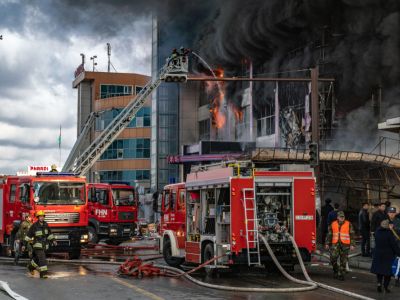Israeli diplomatic sources said Friday that Palestinian President Yasser Arafat and Israeli Foreign Minister Shimon Peres are likely to meet Saturday night, and it will subject to the security situation in the Palestinian territories, reported Haaretz newspaper.
But it quoted Palestinian sources as saying that Peres had asked Arafat to delay the meeting to Sunday
An Israeli cabinet meeting held late Thursday night ended with no substantial decisions reached in regard to a meeting between Peres and Arafat.
Diplomatic sources said that Sharon would affirmatively respond the request from the United States to allow the Peres-Arafat meeting to take place, despite the fragile ceasefire that is not absolute.
Before midnight Thursday cabinet ministers held a diplomatic-security meeting.
According to the paper, several high-ranking Israeli military officials said that a cease-fire proposed by Arafat on Wednesday was not “holding out.”
They said that Arafat was making efforts to enforce the truce, but that they were not enough. The officials added that the proposal was only a “tactical step intended to buy time.”
Before the cabinet convened, Peres and Sharon met to discuss Peres' planned meeting with Arafat.
On Thursday, Peres continued preparations for the meeting, including a face-to-face session with senior Palestinian officials Abu Ala and Saeb Erekat. The foreign minister spoke with Arafat at length after the drive-by shooting in the West Bank settlement of Tekoa that killed a 26-year-old Jewish woman and seriously wounded her husband, the paper added.
Arafat told Peres during the phone call that he had ordered the “arrest of the attackers, and that the PA had agreed to reconvene the tripartite security monitoring committee chaired by the CIA's representative in Israel.”
Israeli sources said that Sharon would not scuttle a Peres-Arafat rendezvous, despite the cease-fire violations, as Israel could not afford to reject the US administration's request for the meeting to take place.
"We cannot be seen as rejecting the American coalition," said a diplomatic source in Jerusalem, adding "that won't serve Israel's interests." But, the source added, "we also can't accept with equanimity the continuing violence on the ground."
During the cabinet meeting Thursday night, Haaretz said that Sharon prepared a "package" of proposals that he wants as preconditions to a Peres-Arafat meeting:
-Immediate implementation of the security monitoring committee, with the American representative serving as an arbitrator in case of disputes. Israel wants the Americans to determine whether Arafat is making efforts to keep the cease-fire and to identify those places where "he's trying but not succeeding," like Rafah, where Palestinian troops have been unable to impose their will. Israel asked for the monitoring committee to convene a few days ago but the Americans haven't responded. A security source last night suggested the Americans are holding out the monitoring committee as a "carrot" that Israel will get only if the Peres-Arafat meeting takes place.
-The full cease-fire will be implemented in stages, as originally proposed by Peres several weeks ago. In those areas where quiet reigns, Israel will loosen travel restrictions and allow workers to enter Israel to work.
-In Palestinian areas where violence continues, Israel will be free to prevent attacks, on the basis of intelligence about planned attacks. The military operations will be "quiet and pinpoint" so as not to disrupt American diplomatic efforts in the region and in any case, the IDF won't conduct incursions into Palestinian-controlled Area A.
Meanwhile, the Palestinian leadership late Thursday accused Israel of "sabotaging" the fragile ceasefire and returning to its military escalation, the official Palestinian WAFA news agency said.
"The international community must push Israel to react positively and quickly to the Palestinian initiative, by lifting the blockade of the (Palestinian territories), withdrawing its tanks, respecting the ceasefire and ending its military escalation," it said in a statement after a meeting chaired by Arafat.
"Israel wants to sabotage international efforts and the Palestinian initiative announced by President Arafat for the ceasefire and peace in the region," said the leadership, which includes Palestinian lawmakers and the executive of the Palestine Liberation Organization (PLO).
It accused Sharon's hardline government of "wanting to profit from the terrorist attacks in the United States to continue its aggressions against the Palestinian people and reinforce its policy of blockading Palestinian cities."
The two-day-old ceasefire started to crumble Thursday after a Palestinian man died after being shot in the head by Israeli forces in the southern Gaza Strip, and a drive-by grenade and shooting attack on a nearby Jewish settlement left five Israeli soldiers injured.
Later in the day, Fateh movement’s military wing, Al Aqsa Brigades said staged an attack against an Israeli tank in the Nablus area in the West Bank, reported Al Jazeera satellite channel. But Israeli media reported that there were no injuries or damage in the operation.
The same group claimed responsibility for the killing of the settler.
It said the attack was in "direct and immediate response to Israeli bombardments yesterday (Wednesday) in Hebron, Nablus and Gaza."
They, in turn, were Israeli responses to attacks by another group close to Fateh, the Popular Army Front-Return Battalions, in which two settlers were wounded, the army said.
Hospital sources said four Palestinians were wounded in retaliatory shelling.
Israeli forces shot dead a Palestinian and wounded another at a Gaza Strip checkpoint, after five Israeli soldiers were wounded in a drive-by shooting.
Muneer Mustapha Abu Moussa, 33, was shot dead while driving in a taxi near a checkpoint between the Jewish settlement of Kfar Darom and the Gush Katif settlement bloc, Palestinian security officials said.
The army said the shooting was in response to the drive-by shooting and grenade attack on five soldiers who were slightly wounded outside a Jewish settlement in the Gaza Strip.
The ceasefire was called Tuesday after intense pressure from the United States in the wake of the terror attacks on New York and Washington, although hardline Palestinian militants vowed to continue their armed resistance.
An Israeli security guard was later shot and slightly injured at Karni, the northeastern crossing point between Gaza and Israel, the army said, quoted by AFP.
"We see that the ceasefire is very tenuous, it's not holding," said Ranaan Gissin, spokesman for Israeli Prime Minister Ariel Sharon – Albawaba.com
© 2001 Al Bawaba (www.albawaba.com)









